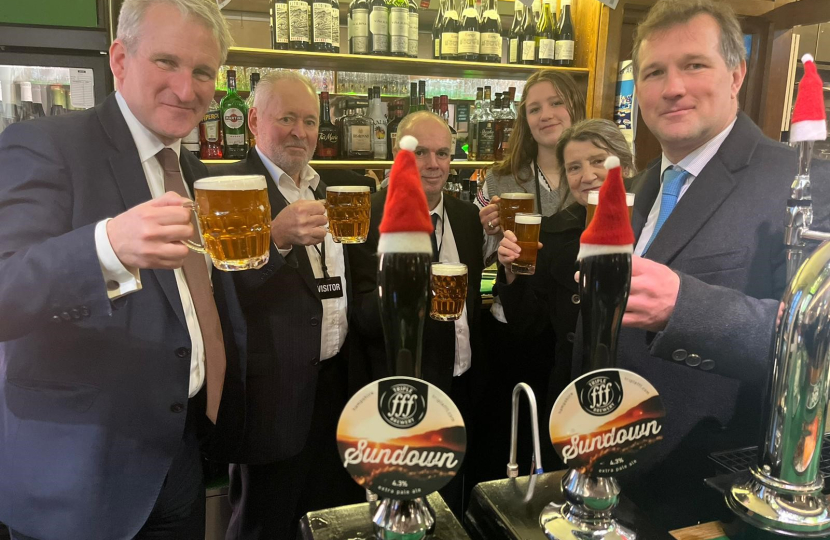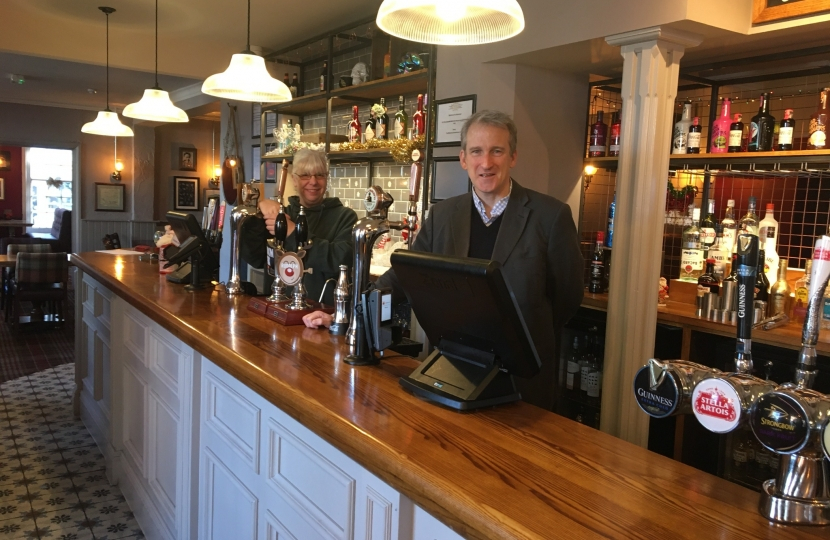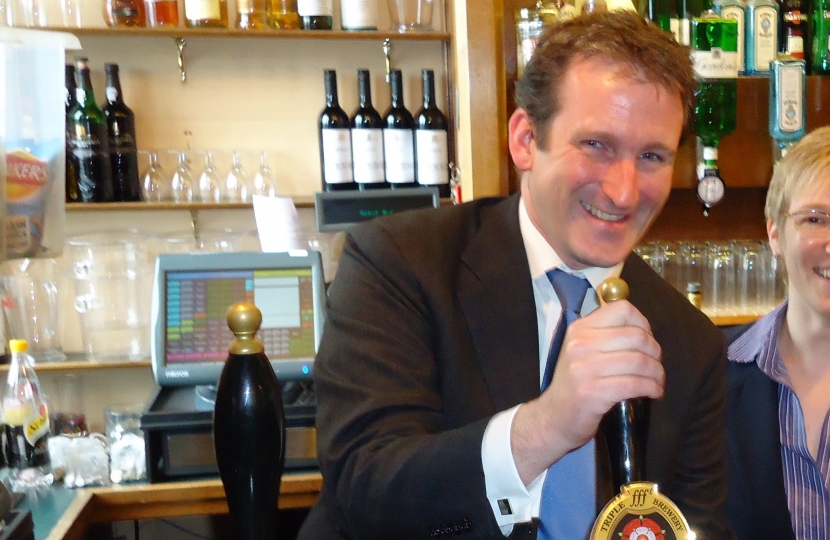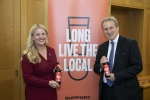Pubs and shops in the community
Pubs and local shops are at the heart of the community, but changing consumer habits have led in many cases to a decline in the use of the local shops or pubs, which has undermined the sustainability of many rural businesses.
In some cases, running these key facilities as community businesses may be the best way to maintain the service and to ensure the local community is invested in supporting it.
The government's changes to business rates for the hospitality sector are concerning for our pubs and restaurants. I spoke about the impact of reducing business rates relief on the hospitality sector in a debate in Parliament in November 2024 (see above).
Ownership Models
A community shop or pub is a business owned and controlled by a number of people from within the community for the benefit of the community. The shop or pub is owned by members (shareholders), who are volunteers, and it is run democratically with a one-member-one-vote system and an elected committee or board. The committee can either delegate the day-to-day management of the business to a team of paid staff and volunteers or sublet to a tenant who will operate the business within a framework set up by the community.
The businesses use a mixture of loans/mortgages, donations/fundraising and community shares, and some grants, to raise the required finance.
Legal structures include Community Benefit Societies (CBS), Co-operative Societies, Companies Limited by Guarantee, and Community Interest Companies (CIC). CBS is the most popular model, as it is the model that can issue community shares.
Core services offered by these shops or pubs include post office services, collection point for parcels, cash back at the till, home delivery, community information board, and a book exchange.
https://www.gov.uk/business-and-industry/community-interest-companies
Assets of Community Value (ACV)
The introduction of the Localism Act in 2011 allowed communities to register pubs and other community facilities as Assets of Community Value (ACV), giving them greater planning protection against possible demolition or conversion. A successful registration gives the community the right to bid for the asset.
A building or land can be an ACV if its main use has recently been or is presently used to further the social wellbeing or social interests of the local community and could do so in the future. The Localism Act states that ‘social interests’ include cultural, recreational and sporting interests.
A number of community organisations can make nominations, including parish councils, neighbourhood forums, and not-for-profit organisations including charities.
A building that is listed as an ACV will remain on the register for five years and provides the opportunity for two moratorium periods to be triggered. Both start from the date the owner of the asset informs the local authority of their intention to sell. The first is the interim moratorium period, which is six weeks, during which time a community organisation can determine if they want to be considered as a potential bidder. The other is a full moratorium period, which is six months, during which a community organisation can develop a proposal and raise the money required to bid to buy the asset.
Once the six months is up, the building's owner can then decide whether to sell his property and who to sell to.
A briefing document from the House of Commons Library is available at: https://researchbriefings.parliament.uk/ResearchBriefing/Summary/SN06366
Local assets need to be registered with East Hampshire District Council, and they provide guidance on how to apply for this at: https://www.easthants.gov.uk/assets-community-value
Assets currently on the EHDC register include Horndean Library and various pubs across East Hampshire including:
- The Three Horseshoes, Worldham
- The Village Inn, Buriton
- The Queens Head, Sheet
Frensham Village Shop, just over the border in Surrey, is an example of a community-run shop with a professional manager, three part-time postal staff, and 60 part-time volunteers. They are registered as a Community Interest Company (CIC). They offer a wide range of services including a Post Office which is open from 9am to 7pm
Funding and Support
Brexit pubs guarantee
Last August (2023), the Chancellor's 'Brexit pubs guarantee' came into effect; in essence the guarantee does the following:
- Freezes duty on draught beer and cider in pubs, meaning that you will never pay more for your pint in a pub than you do in a supermarket (the duty in pubs could be up to 11p lower than in supermarkets). This will put the 38,000 pubs in the UK on a permanent even footing with supermarkets.
- Shakes up the duty scheme for other drinks, which sees drinks taxed by strength - so the higher the alcohol content, the higher the duty. This is great news for those who prefer low alcohol drinks, which will now be taxed at a lower rate.
- Introduces Small Producer Relief to help small businesses and start-ups, such as micro breweries, create new drinks, innovate and grow.
As someone who spent many years working in the pubs and hospitality business, this is a much needed shake up of the alcohol duty scheme. I hope this will get customers back into the Great British pub, after a difficult period for publicans with Covid and high food and energy prices.
Other forms of support
It's a good idea to start with the local Parish Council and District or Borough Councils to find out the type of support or grants they can offer. This could include:
Action Hampshire - offer support and advice for not-for-profit organisations to deliver services to local people and communities.
Plunkett Foundation - set up in 1919, the Plunkett Foundation supports people, predominantly in rural areas, to set up and run community businesses. They offer advice on a wide range of practical aspects including formulating a business case, legal structures, raising funds, engagement with the community, and many case studies. Detailed documents are available via their website.
Power to Change - an independent charitable trust that supports and develops community businesses in England. They use their endowment to strengthen community businesses, providing money, advice and support. They run specific programmes that are open to applications.
Pub is the Hub - encourage communities, licensees, pub owners, breweries and the private sector to work together to match community priority needs with additional services, which can be provided by the local pub and a good licensee. They can also offer advice on community ownership.
The Royal Countryside Fund - established by King Charles in 2010, when Prince of Wales, it works to improve the prospects of family farm businesses and the quality of rural life.
Hampshire and IoW Community Foundation - an independent charitable foundation helping disadvantaged communities in Hampshire and the Isle of Wight.
Please note: the content on this page is intended for initial information and signposting only. More recent material may be available, and groups interested in pursuing any of these options are advised to search on gov.uk for the latest advice.






